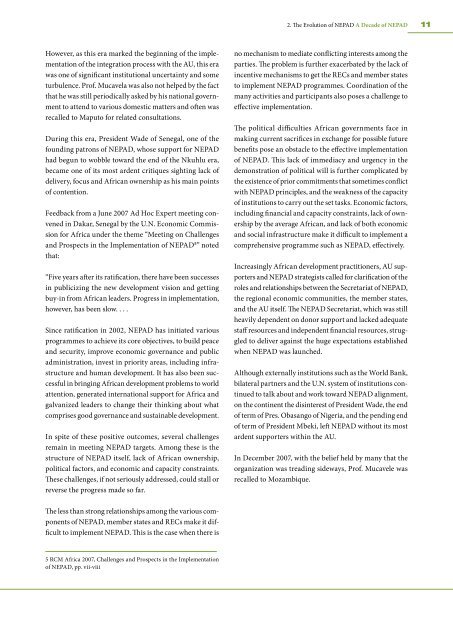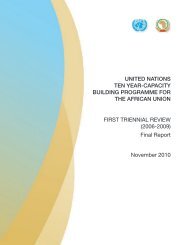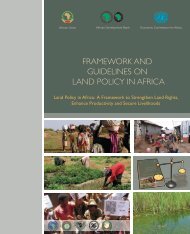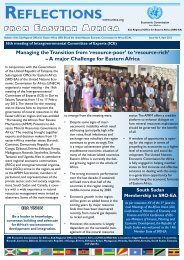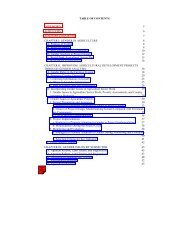A Decade of NEPAD - Economic Commission for Africa - uneca
A Decade of NEPAD - Economic Commission for Africa - uneca
A Decade of NEPAD - Economic Commission for Africa - uneca
You also want an ePaper? Increase the reach of your titles
YUMPU automatically turns print PDFs into web optimized ePapers that Google loves.
However, as this era marked the beginning <strong>of</strong> the implementation<br />
<strong>of</strong> the integration process with the AU, this era<br />
was one <strong>of</strong> significant institutional uncertainty and some<br />
turbulence. Pr<strong>of</strong>. Mucavela was also not helped by the fact<br />
that he was still periodically asked by his national government<br />
to attend to various domestic matters and <strong>of</strong>ten was<br />
recalled to Maputo <strong>for</strong> related consultations.<br />
During this era, President Wade <strong>of</strong> Senegal, one <strong>of</strong> the<br />
founding patrons <strong>of</strong> <strong>NEPAD</strong>, whose support <strong>for</strong> <strong>NEPAD</strong><br />
had begun to wobble toward the end <strong>of</strong> the Nkuhlu era,<br />
became one <strong>of</strong> its most ardent critiques sighting lack <strong>of</strong><br />
delivery, focus and <strong>Africa</strong>n ownership as his main points<br />
<strong>of</strong> contention.<br />
Feedback from a June 2007 Ad Hoc Expert meeting convened<br />
in Dakar, Senegal by the U.N. <strong>Economic</strong> <strong>Commission</strong><br />
<strong>for</strong> <strong>Africa</strong> under the theme “Meeting on Challenges<br />
and Prospects in the Implementation <strong>of</strong> <strong>NEPAD</strong> 5 ” noted<br />
that:<br />
“Five years after its ratification, there have been successes<br />
in publicizing the new development vision and getting<br />
buy-in from <strong>Africa</strong>n leaders. Progress in implementation,<br />
however, has been slow. . . .<br />
Since ratification in 2002, <strong>NEPAD</strong> has initiated various<br />
programmes to achieve its core objectives, to build peace<br />
and security, improve economic governance and public<br />
administration, invest in priority areas, including infrastructure<br />
and human development. It has also been successful<br />
in bringing <strong>Africa</strong>n development problems to world<br />
attention, generated international support <strong>for</strong> <strong>Africa</strong> and<br />
galvanized leaders to change their thinking about what<br />
comprises good governance and sustainable development.<br />
In spite <strong>of</strong> these positive outcomes, several challenges<br />
remain in meeting <strong>NEPAD</strong> targets. Among these is the<br />
structure <strong>of</strong> <strong>NEPAD</strong> itself, lack <strong>of</strong> <strong>Africa</strong>n ownership,<br />
political factors, and economic and capacity constraints.<br />
These challenges, if not seriously addressed, could stall or<br />
reverse the progress made so far.<br />
The less than strong relationships among the various components<br />
<strong>of</strong> <strong>NEPAD</strong>, member states and RECs make it difficult<br />
to implement <strong>NEPAD</strong>. This is the case when there is<br />
5 RCM <strong>Africa</strong> 2007, Challenges and Prospects in the Implementation<br />
<strong>of</strong> <strong>NEPAD</strong>, pp. vii-viii<br />
2. The Evolution <strong>of</strong> <strong>NEPAD</strong> A <strong>Decade</strong> <strong>of</strong> <strong>NEPAD</strong><br />
no mechanism to mediate conflicting interests among the<br />
parties. The problem is further exacerbated by the lack <strong>of</strong><br />
incentive mechanisms to get the RECs and member states<br />
to implement <strong>NEPAD</strong> programmes. Coordination <strong>of</strong> the<br />
many activities and participants also poses a challenge to<br />
effective implementation.<br />
The political difficulties <strong>Africa</strong>n governments face in<br />
making current sacrifices in exchange <strong>for</strong> possible future<br />
benefits pose an obstacle to the effective implementation<br />
<strong>of</strong> <strong>NEPAD</strong>. This lack <strong>of</strong> immediacy and urgency in the<br />
demonstration <strong>of</strong> political will is further complicated by<br />
the existence <strong>of</strong> prior commitments that sometimes conflict<br />
with <strong>NEPAD</strong> principles, and the weakness <strong>of</strong> the capacity<br />
<strong>of</strong> institutions to carry out the set tasks. <strong>Economic</strong> factors,<br />
including financial and capacity constraints, lack <strong>of</strong> ownership<br />
by the average <strong>Africa</strong>n, and lack <strong>of</strong> both economic<br />
and social infrastructure make it difficult to implement a<br />
comprehensive programme such as <strong>NEPAD</strong>, effectively.<br />
Increasingly <strong>Africa</strong>n development practitioners, AU supporters<br />
and <strong>NEPAD</strong> strategists called <strong>for</strong> clarification <strong>of</strong> the<br />
roles and relationships between the Secretariat <strong>of</strong> <strong>NEPAD</strong>,<br />
the regional economic communities, the member states,<br />
and the AU itself. The <strong>NEPAD</strong> Secretariat, which was still<br />
heavily dependent on donor support and lacked adequate<br />
staff resources and independent financial resources, struggled<br />
to deliver against the huge expectations established<br />
when <strong>NEPAD</strong> was launched.<br />
Although externally institutions such as the World Bank,<br />
bilateral partners and the U.N. system <strong>of</strong> institutions continued<br />
to talk about and work toward <strong>NEPAD</strong> alignment,<br />
on the continent the disinterest <strong>of</strong> President Wade, the end<br />
<strong>of</strong> term <strong>of</strong> Pres. Obasango <strong>of</strong> Nigeria, and the pending end<br />
<strong>of</strong> term <strong>of</strong> President Mbeki, left <strong>NEPAD</strong> without its most<br />
ardent supporters within the AU.<br />
In December 2007, with the belief held by many that the<br />
organization was treading sideways, Pr<strong>of</strong>. Mucavele was<br />
recalled to Mozambique.<br />
11


